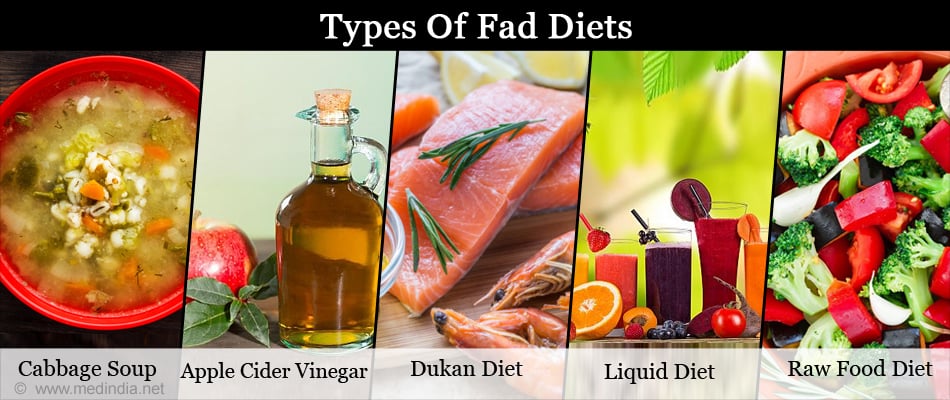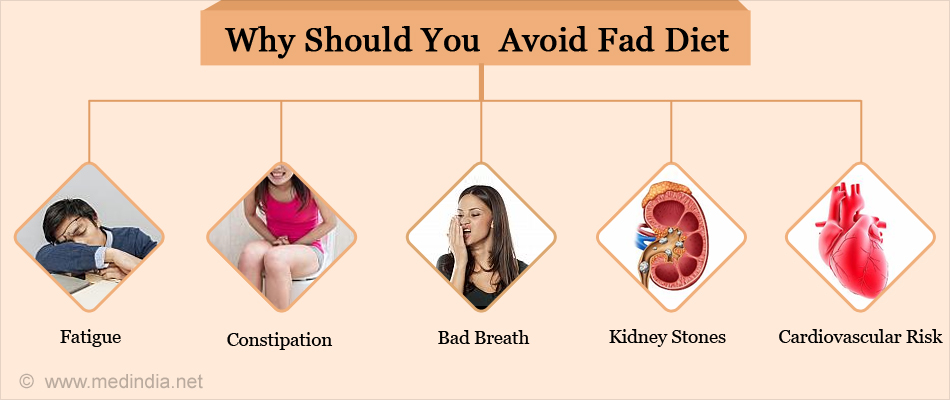- Understanding meal patterns: definitions, methodology and impact on nutrient intake and diet quality - (https://www.ncbi.nlm.nih.gov/pmc/articles/pmc4501369/)
- Potential long-term consequences of fad diets on health, cancer, and longevity: lessons learned from model organism studies - (https://www.ncbi.nlm.nih.gov/pubmed/17535033)
- Micronutrient quality of weight-loss diets that focus on macronutrients: results from the A TO Z study - (https://www.ncbi.nlm.nih.gov/pmc/articles/pmc2904033/)
- Fad diets and their effect on urinary stone formation - (https://www.ncbi.nlm.nih.gov/pmc/articles/pmc4708571/)
- Dietary Approaches to the Treatment of Obesity - (https://www.ncbi.nlm.nih.gov/pmc/articles/pmc3222874/)
- Dietary intakes associated with successful weight loss and maintenance during the Weight Loss Maintenance Trial - (https://www.ncbi.nlm.nih.gov/pmc/articles/pmc3225890/)
- Breakfast consumption and weight-loss maintenance: results from the MedWeight study - (https://www.ncbi.nlm.nih.gov/pubmed/27185413)
- Effect of diet and exercise, alone or combined, on weight and body composition in overweight-to-obese post-menopausal women - (https://www.ncbi.nlm.nih.gov/pmc/articles/pmc3406229/)
- Search for the Competitive Edge: A History of Dietary Fads and Supplements - (http://m.jn.nutrition.org/content/127/5/869s.ful)
What Is A Fad Diet?
Fad diet is a diet that ensures quick weight loss results. However, such a weight loss is temporary. Fad diets provide inadequate nutrients, and thus, are considered to be unhealthy and even dangerous.
This diet restricts intake of various food groups, and thus adherence to such a diet on a long term basis becomes difficult.
Thus, people tend to re-gain the weight that has been lost previously, once they revert to their usual way of eating.
List Of Fad Diets
- Cabbage soup diet
- Apple cider vinegar diet
- Supplement diet
- Low-fat diet
- HCG diet
- Elimination diet
- Dukan diet
- Liquid diet
- South beach diet
- Blood type diet
- GM (general motor) diet
- Raw food diet
- Ketogenic diet
- Low carbohydrate diet
- Zone diet
- Gluten free diet
- Atkins diet
- 3-day diet
- Paleo diet

Reasons To Avoid Fad Diet
Though fad diets help in quick weight loss, they expose our body to a number of health risks. Let us throw some light on the risks of fad diets and why they should be avoided:
Weight Re-Gain
Fad diets do not promote healthy eating practices. These diets may be a 'quick fix' but they are very difficult to follow over the long term. One might lose weight quickly but once he or she returns to the old eating patterns, all the weight that had been lost is usually re-gained. Such a weight gain, in turn, increases the risk of high cholesterol levels, diabetes and cardiovascular diseases.
Micronutrient Deficiency
Overweight or obese individuals often follow fad diets to shed the extra kilos but these diets strictly restrict the intake of various food groups. This reduces the entry of essential nutrients into the body.
To cut down on calories, fad diets focus on macronutrient content, for example, low-carbohydrate, or low-fat, or high-protein diet whereas the micronutrient intake is often overlooked. Deficiency of vitamins and minerals may lead to poor immunity levels, bone and joint pain, hair fall and so on.
Atkins diet is a low-carbohydrate diet that allows intake of less than 20 grams of carbohydrate per day. It restricts intake of carbohydrate sources such as whole grains and fruits which are also a source of B-complex vitamins and vitamin C respectively. Such restrictions can lead to micronutrient deficiency.
Fatigue
Eating less than what your body requires can make you feel tired.
Both the brain, as well as the muscles in the body, derive energy from carbohydrate, which is the preferred fuel for the body. Fad diets, however, are low calorie diets that provide less energy. Such severe restriction of carbohydrates, can leave one feeling fatigued and lethargic all the time.
Over-exercising and inadequate food intake may also push your body into a starvation mode, which can cause muscle weakness, and even moodiness.
Constipation
Constipation is another common problem associated with individuals following fad diets, especially low-carbohydrate, high protein and high fat diet. The low fiber content in this diet leads to constipation.
A diet containing adequate fiber prevents constipation and stimulates intestinal motility. Furthermore, chronic constipation over a long period of time may lead to hemorrhoids.
Bad Breath
Bad breath is also associated with fad diets. While maintaining a high-protein, high-fat diet regime, fatty acids become the main source of energy for the body.
These fatty acids are then converted to ketones, a source of energy in the body. Ketones that are not used by the body are excreted in the expired air which results in bad breath.
One might thus end up with an attractive waistline due to a fad diet, but it won’t do their breath much good.
Kidney Stones
Studies have found that fad diets which are high in protein, such as Dukan diet, increase the risk of developing kidney stones.
Protein-rich diet raises the excretion of calcium in the urine. This makes the urine concentrated and increases the risk of kidney stones.
Furthermore, it reduces the urinary pH and creates a favorable environment for the formation of kidney stones. High-protein diets further reduce 'urinary citrate' which is an inhibitor of calcium salt crystallization, thus leading to kidney stone formation.
Cardiovascular Risk
Fad diets are often imbalanced diet, focusing solely on one or two macronutrients. This diverts the attention away from micronutrient intake and may lead to its deficiency.
Vitamins and minerals are very important for heart health. Their deficiency can make the heart weak and lead to heart diseases. Low levels of blood minerals are associated with irregular heartbeats and cardiac arrest.
Furthermore, consuming a high-fat, low-carbohydrate diet increases the risk of plaque or clot formation. These diets are typically high in cholesterol and saturated fat which increase the risk of heart diseases.

Health Tips For Healthy Weight Loss
Fad diets have numerous side-effects and disadvantages. On a long-term basis it will do no good to the body, rather it might end up harming it. Therefore, it is vital to follow a healthy and well-balanced diet to cut down on the fat, and lose weight.
Here are some tips for a healthy way to shed those extra kilos:
Eat Small, Frequent Meals
Eating small, frequent and wholesome meals at regular intervals helps in weight loss. This strategy keeps hunger pangs at bay and prevents one from overeating.
Fad diets recommend intake of calorie-restricted diet or just plain liquids. Thus, the person may feel hungry and end up overeating. Therefore, it is better to space out meals in order to avoid excess calorie intake and weight gain.
Do Not Skip Breakfast
Breakfast is the first meal of the day, and should not be skipped. Studies have revealed that individuals who consume a hearty and wholesome breakfast tend to feel less hungry throughout the day.
Furthermore, regular breakfast-eaters have lesser cravings for sweets and unhealthy foods. Additionally, people who skip breakfast tend to overeat during lunch and other meals. Thus, a regular habit of consuming a large, healthy breakfast can help in weight loss and weight maintenance after weight loss.
Eat A Balanced Diet
Fad diet involves restriction of various food groups. It concentrates more on macronutrients and micronutrients are often left unnoticed. This has its own disadvantages, and it affects body weight and body fat.
It has been found that a well-balanced diet that focuses on macro as well as micronutrients helps to lose weight and prevents the negative impacts of fad diets.
For weight loss, it is important to restrict the calories, but healthy food options such as whole grains, fruits, vegetables and low fat dairy products must be consumed.
Do Not Severely Restrict Carbohydrates
Carbohydrate intake should be restricted for weight loss, but do not completely exclude it from your diet. Unhealthy sources of carbohydrate such as sugar, refined flour and its products can be ruled out from the daily diet.
Include fiber-rich carbohydrate sources such as whole grains and fruits. These fiber-rich foods provide satiety that keeps hunger pangs at bay. Furthermore, severe carbohydrate restrictions as seen in fad diet only aid in temporary weight loss, and causes constipation, fatigue and other health issues.
Exercise Daily
Club your healthy food choices with daily physical activity. Exercise can help in weight loss as well as fat loss. Individuals with diabetes and high cholesterol levels can also benefit from daily exercise. However, exercise alone cannot help you lose weight. Right food selection, limiting portion sizes and regular meals play an equally essential role in reducing weight.

Bottom-line: Choose your foods wisely. Do not just eat to lose weight but to live a healthy life.










